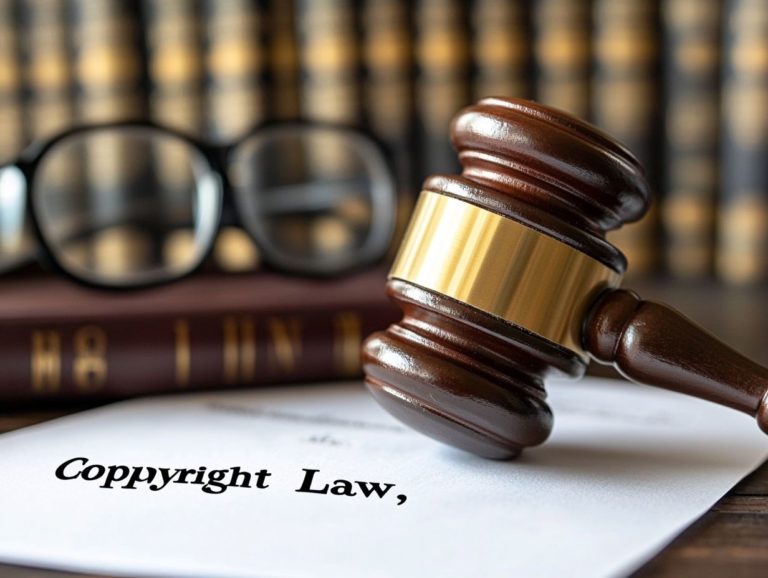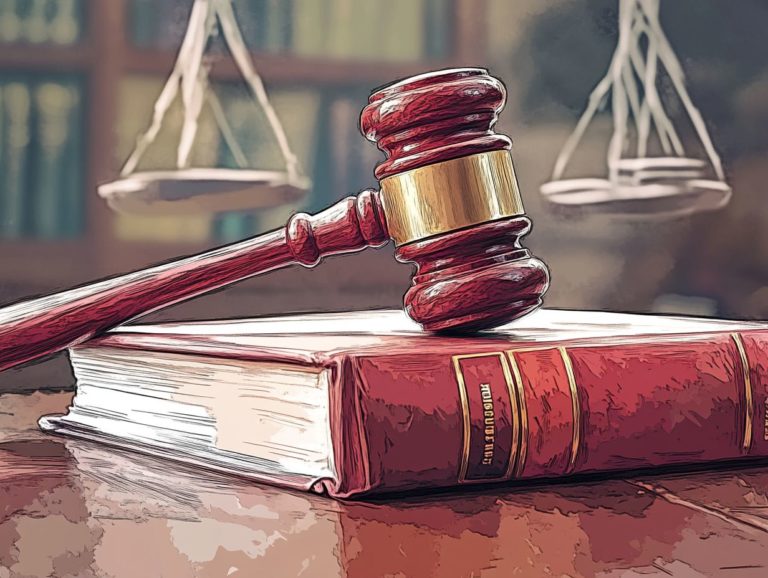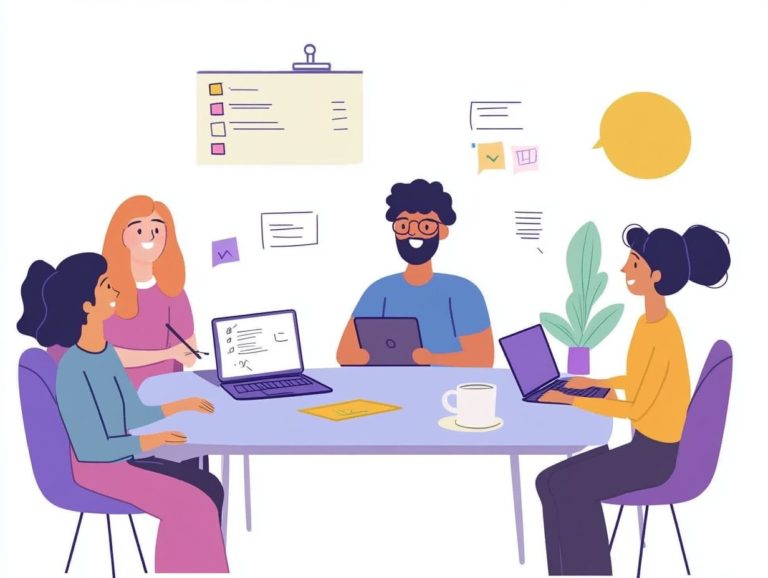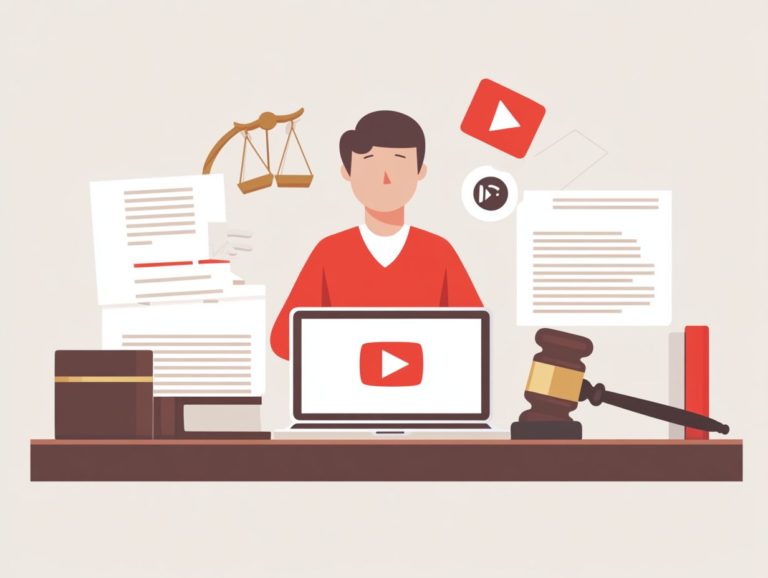The Future of Copyright in the Digital Age
Copyright has undergone a remarkable transformation, evolving from its historical roots into a complex landscape shaped by digital technology. Let s explore the exciting journey of copyright!
As you navigate this new era, you ll encounter unique challenges and opportunities as both a creator and a consumer. This article examines the historical context of copyright, current laws, and the ongoing debate surrounding it.
It also looks ahead to potential future changes and offers practical strategies for protecting intellectual property in an age where digital content is more accessible than ever. Jump right in to discover the thrilling world of copyright!
Contents
- Key Takeaways:
- The Evolution of Copyright
- How Digital Technology is Revolutionizing Copyright
- Current Laws and Regulations
- The Debate on Copyright in the Digital Age
- Potential Future Changes to Copyright
- In Today s Digital World, Protecting Your Copyright is More Important Than Ever!
- Frequently Asked Questions
Key Takeaways:
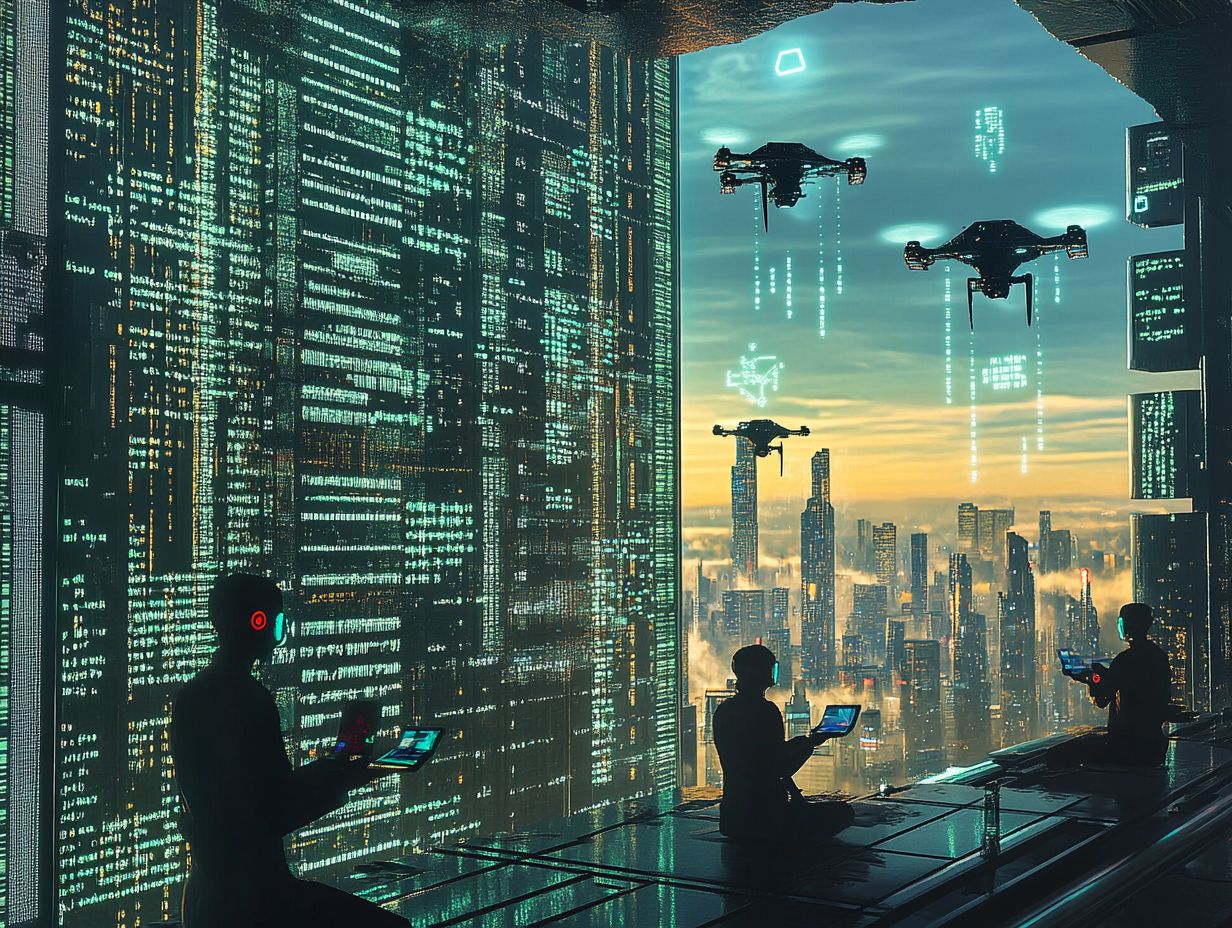
- The digital age has revolutionized how content is created, shared, and consumed, leading to a need for updates in copyright laws to adapt to these changes.
- The debate surrounding copyright focuses on balancing the protection of creators’ rights while still allowing for fair use and access for consumers.
- Potential future changes to copyright include stricter enforcement measures and the implementation of new technologies like blockchain for more secure and transparent protection of intellectual property.
The Evolution of Copyright
The evolution of copyright law has been significantly shaped by technological advancements, especially in the digital age. The swift rise of artificial intelligence (AI) technologies, which create new content like art or text, presents noteworthy copyright challenges for both copyright owners and creators.
As society increasingly embraces digital content consumption, understanding the role of copyright in digital content is essential for protecting authors’ rights and navigating the complexities of fair use in today’s intricate legal landscape.
Historical Context and Changes in the Digital Age
Historically, copyright law was crafted to safeguard original works from unauthorized use. However, the digital age has ushered in a host of new copyright challenges, including those related to the future of trademarks in a digital world, stemming from the ease of creating and sharing content.
As society shifted from physical media to digital platforms, legal frameworks have often struggled to keep up with rapid technological advancements. Landmark cases, such as the 1984 Supreme Court decision in Betamax, underscored the complexities surrounding fair use in the context of emerging technologies.
The introduction of the Digital Millennium Copyright Act (DMCA) in 1998 sought to address the burgeoning online landscape, yet the rise of generative AI has added further layers of complexity to copyright law.
As you navigate this evolving terrain, issues like content ownership and fair use are at the forefront of creators’ minds. Copyright law continually adapts, reflecting the essential balance between fostering innovation and ensuring protection in our digital world.
How Digital Technology is Revolutionizing Copyright
Digital technology has profoundly transformed copyright law, fundamentally changing how creative works are produced, shared, and protected. This evolution has given rise to significant copyright infringement issues that challenge traditional legal frameworks and the rights of copyright owners, especially regarding the future of licensing agreements in a digital world.
You must navigate these complexities to safeguard your creative endeavors in an increasingly digital landscape.
Challenges and Opportunities for Creators and Consumers
The rise of digital content and technology companies presents both challenges and opportunities as you navigate the complexities of copyright. Understanding fair use and seeking permissions from copyright owners are essential skills in this arena.
In this ever-evolving landscape, you must adapt to new regulations that could either stifle your creativity or ignite your innovative spirit. By effectively utilizing copyright law, you can protect your work while appreciating the nuances of fair use, which allows for limited use of copyrighted material without needing explicit permission.
As a consumer, recognize the importance of respecting intellectual property. This fosters a culture of creativity that benefits everyone involved. Engaging with the principles of copyright not only highlights ethical implications but also enriches the overall quality of digital content available in today s interconnected world.
Stay informed and champion copyright rights to protect creativity!
Current Laws and Regulations

Navigating the current laws and regulations surrounding copyright can feel like untangling a complex web. You encounter a blend of national and international frameworks, including the EU Copyright Directive and various national copyright laws.
These regulations are designed to address the ever-evolving landscape of copyright infringement and disputes, reflecting the intricate challenges of today s digital world.
International and National Copyright Laws
International copyright laws, established by organizations like WIPO, interact with national copyright laws to forge a cohesive system that governs the protection of creative works across borders.
This interplay is essential. It helps you navigate the complexities arising from differing national regulations and empowers you to understand your rights in a global context.
Harmonizing these laws helps reduce copyright infringement. It protects authors while facilitating international distribution of their works.
However, challenges remain because enforcement mechanisms vary across countries, underscoring the necessity for ongoing dialogue and reform.
In this intricate landscape, WIPO plays a crucial role, guiding nations in effectively structuring and enforcing their copyright policies to adapt to the ever-evolving digital age.
The Debate on Copyright in the Digital Age
The discussion on copyright in the digital age is characterized by significant ethical concerns that hinge on finding the right balance between safeguarding the rights of copyright owners and permitting fair use.
This tension is vividly illustrated by the multitude of lawsuits that have emerged around copyright infringement issues.
Arguments for and Against Changes to Copyright Laws
Arguments surrounding changes to copyright laws often revolve around the concepts of fair use and copyright exceptions. Supporters argue for more public interest, while critics caution against weakening the protections that copyright owners rely on.
This debate holds increasing significance in our digital age, where sharing content comes with its own set of questions about ownership and distribution rights.
Supporters of reform emphasize the need for flexibility, citing educational uses and transformative works works that change original content into something new as instances where copyright may hinder access to knowledge. Take online education platforms, for example; the adaptation of copyrighted materials for instructional purposes frequently sparks lively discussions about what fair use truly means.
Conversely, copyright holders artists and writers, to name a few argue that their control over and ability to monetize their works is vital for fostering creativity and innovation.
As lawmakers navigate the intricate landscapes of modern copyright, finding a balance between these competing interests becomes an essential consideration.
Potential Future Changes to Copyright
Potential future changes to copyright will likely be shaped by technological advancements and the continuous evolution of digital rights.
Modernizing copyright law is urgent and essential to keep up with today’s digital landscape, particularly in light of the future of IP strategy, ensuring it effectively addresses emerging copyright disputes.
Proposed Solutions and Predictions

Proposed solutions for copyright modernization suggest that incorporating AI innovations and fostering collaborative frameworks between technology companies and copyright owners could significantly enhance copyright protection in the digital landscape, as discussed in the future of international IP law.
Such partnerships hold the potential to develop advanced tools that not only pinpoint copyright infringements in real time but also streamline licensing processes.
By leveraging machine learning algorithms, technology companies can empower copyright owners to track their content across various platforms, ensuring creators receive the compensation they deserve.
These collaborations may usher in new licensing models that adapt to the rapid advancements in digital distribution methods.
As these innovations take shape, both stakeholders must confront the challenges posed by evolving algorithms and user-generated content, ultimately crafting a future where creativity and technological progress coexist in harmony.
Stay tuned for updates on copyright laws as they evolve with technology!
In Today s Digital World, Protecting Your Copyright is More Important Than Ever!
Protecting copyright in the digital age requires various strategies. You must consider robust legal protections alongside proactive measures to safeguard your work.
Understanding the dynamics of copyright infringement within a rapidly evolving digital landscape is crucial. By understanding these factors, you can effectively navigate the complexities of copyright in today’s world.
Strategies for Creators and Consumers
Both creators and consumers have opportunities to implement effective strategies for copyright protection. This ensures a respectful approach to intellectual property while addressing the ethical concerns prevalent in the digital content landscape.
As a creator, consider applying Creative Commons licenses to your work. This allows you to specify how others can use your content, fostering a collaborative and equitable environment. Conversely, as a consumer, prioritize sourcing materials from reputable and licensed platforms to ensure compliance with copyright laws.
Engaging in discussions about the implications of reuse and modification can promote awareness of cultural sensitivities and rights associated with various forms of expression. Act now to help contribute to a more ethical digital ecosystem!
Frequently Asked Questions
- What is copyright?
- Copyright is a legal concept that grants exclusive rights to the creators of original works such as books, music, films, and software. It ensures that creators have the right to control and profit from their work.
- How is copyright affected by the digital age?
- The digital age has made it easier to share and distribute copyrighted material, making it more challenging for creators to protect their work and prevent unauthorized use.
- What challenges does the digital age pose for copyright laws?
- The main challenge is the ease of reproducing and distributing copyrighted material without permission or proper compensation. It also complicates tracking and enforcing copyrights and determining the original creator of a digital work.
- What are some potential solutions to these challenges?
- Efforts to update copyright laws, such as the Digital Millennium Copyright Act, are ongoing. Technology like digital watermarking and content recognition software can also help identify and protect copyrighted material.
- What impact does the digital age have on copyright infringement?
- The digital age has made it easier for individuals to commit copyright infringement, whether intentionally or unknowingly. The widespread availability of digital content and lack of clear guidelines can make it difficult for people to understand what is or isn’t allowed.
- How can individuals and businesses ensure they are respecting copyright laws in the digital age?
- It is essential to be aware of and follow copyright laws, including obtaining permission and properly attributing any copyrighted material. Using content under fair use laws and obtaining licenses from copyright owners can also help ensure compliance.
Take action today to safeguard your work and respect the rights of others in the digital space!

